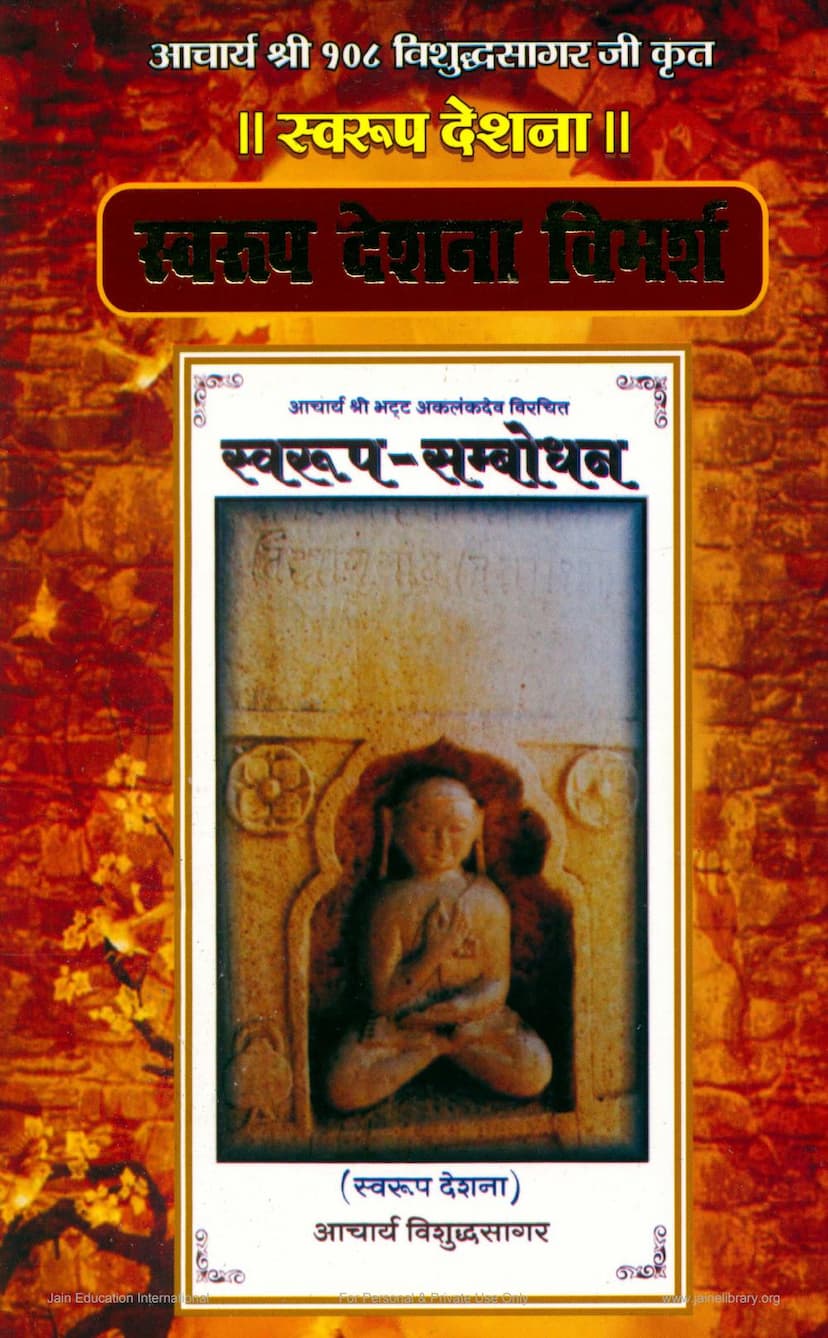Swarup Deshna Vimarsh
Added to library: September 2, 2025

Summary
Here's a comprehensive summary of the Jain text "Swarup Deshna Vimarsh" based on the provided pages:
Title: Swarup Deshna Vimarsh (स्वरूप देशना विमर्श) Author of the main work: Acharya Shri 108 Vishuddh Sagar Ji Krit (कृत) Original work being discussed: Acharya Shri Bhatt Akalankdev Virachit Swarup-Sambodhan (विरचित स्वरूप-सम्बोधन) Publisher: Akhil Bharatiya Shraman Sanskriti Seva Samiti (अखिल भारतीय श्रमण संस्कृति सेवा समिति)
Overall Summary:
"Swarup Deshna Vimarsh" is a collection of scholarly discussions and reflections on the teachings of Acharya Shri Vishuddh Sagar Ji, specifically focusing on his commentary and exposition of Acharya Bhatt Akalankdev's "Swarup Sambodhan" ( स्वरूप सम्बोधन). The book is the result of a national seminar organized in Agra, where scholars presented their analyses of Acharya Shri Vishuddh Sagar Ji's lectures on "Swarup Sambodhan."
The core of the text revolves around understanding the true nature of the soul (atma) and the Jain philosophical principles that guide towards liberation. Acharya Vishuddh Sagar Ji, known for his profound spiritual insights, intellectual prowess, and ability to simplify complex Jain teachings, presented his commentary on "Swarup Sambodhan" through his "Swarup Deshna" (स्वरूप देशना) lectures. These lectures, delivered in Agra during his Chaturmas in 2012, were compiled into this book after being presented at a seminar.
The book comprises numerous essays by scholars from various parts of India, each delving into different facets of Acharya Vishuddh Sagar Ji's interpretation of "Swarup Sambodhan." These essays explore the philosophical depth, logical reasoning, and practical application of Jain principles as elucidated by Acharya Vishuddh Sagar Ji.
Key Themes and Aspects Covered in the Book:
-
The Nature of the Soul (Atma Swarup): The central theme is understanding the soul's true nature, its inherent purity, and its distinction from material substances and causal interactions. The text emphasizes that the soul is eternal, unchanging in its essence, and distinct from karmic influences and the physical body.
-
Anekantavada and Syadvada: The principles of Anekantavada (non-absolutism) and Syadvada (conditionally true statements) are extensively discussed as the framework for understanding reality. The scholars highlight how Acharya Vishuddh Sagar Ji uses these principles to explain the multifaceted nature of the soul, resolving apparent contradictions like being both "mukta" (liberated) and "amukta" (not fully liberated in all aspects) or "grahy" (perceptible) and "agrahya" (imperceptible).
-
The Role of Knowledge (Gyan) and Right Knowledge (Samyak Gyan): The importance of right knowledge in eradicating ignorance and leading to the purification of the soul is a recurring theme. The essays discuss how correct knowledge is crucial for discerning the real from the unreal, the self from the non-self.
-
Causality and Independence of Soul: The lectures and essays explore the concept of substance (dravya) and its inherent nature, emphasizing the soul's independence in its essential attributes, even while interacting with other substances like karma. The concept of "dravya svatantrya" (substance independence) is analyzed.
-
Distinction between Soul and Non-Soul (Jiva and Ajiva): The text elaborates on the fundamental Jain distinction between soul (Jiva) and non-soul (Ajiva) substances, including matter (Pudgala), dharma, adharma, akasha, and kala.
-
Critique of Other Philosophical Systems: The scholars often reference and refute the views of other philosophical schools (like Buddhism, Vedanta, Samkhya) to establish the unique validity of Jain principles as presented by Acharya Vishuddh Sagar Ji.
-
The Role of Justice and Logic (Nyaya Shastra): The essays underscore the significant role of Nyaya Shastra (logic and jurisprudence) in understanding and establishing Jain philosophical tenets. Acharya Akalankdev's mastery of Nyaya is highlighted, and Acharya Vishuddh Sagar Ji's ability to integrate this logical rigor into spiritual discourse is praised.
-
The Nature of Karma and Liberation: The texts discuss how karmas (actions and their consequences) bind the soul and the path to liberation (moksha) through the practice of the Three Jewels (Ratnatraya: Right Faith, Right Knowledge, Right Conduct).
-
Practical Guidance for Spiritual Life: Beyond philosophical discussions, the book offers practical advice for spiritual aspirants, emphasizing the importance of mindfulness, detachment from worldly desires, and the practice of virtuous conduct (achara) for both ascetics (shramanas) and householders (shravakas).
-
Critique of Societal and Religious Practices: Several essays touch upon contemporary issues within the Jain community, addressing perceived deviations from core principles, the importance of sincere devotion over mere ritual, and the need to uphold the integrity of Jain teachings.
-
The Genius of Acharya Vishuddh Sagar Ji: The scholars consistently praise Acharya Vishuddh Sagar Ji's unique ability to present profound and complex spiritual and philosophical concepts in a simple, accessible, and engaging manner, making them relatable and impactful for a wide audience. His erudition, spiritual discipline, and compassionate approach are repeatedly acknowledged.
-
The Legacy of Acharya Akalankdev: The book also provides insights into the life and work of Acharya Bhatt Akalankdev, acknowledging his pivotal role in defending and elaborating Jain philosophy and logic, particularly against opposing viewpoints.
Structure of the Book:
The book is structured as a collection of essays presented at a seminar, preceded by introductory remarks, blessings from senior ascetics, and editorial notes. It also includes biographical information about Acharya Vishuddh Sagar Ji and a detailed list of his literary works. The essays themselves cover a wide range of topics related to "Swarup Sambodhan" and Acharya Vishuddh Sagar Ji's "Swarup Deshna," often quoting specific verses and providing detailed analyses.
In essence, "Swarup Deshna Vimarsh" serves as a testament to the enduring relevance of Jain philosophy and the impactful teachings of contemporary spiritual leaders like Acharya Vishuddh Sagar Ji, bridging the ancient wisdom of Acharya Akalankdev with modern understanding.